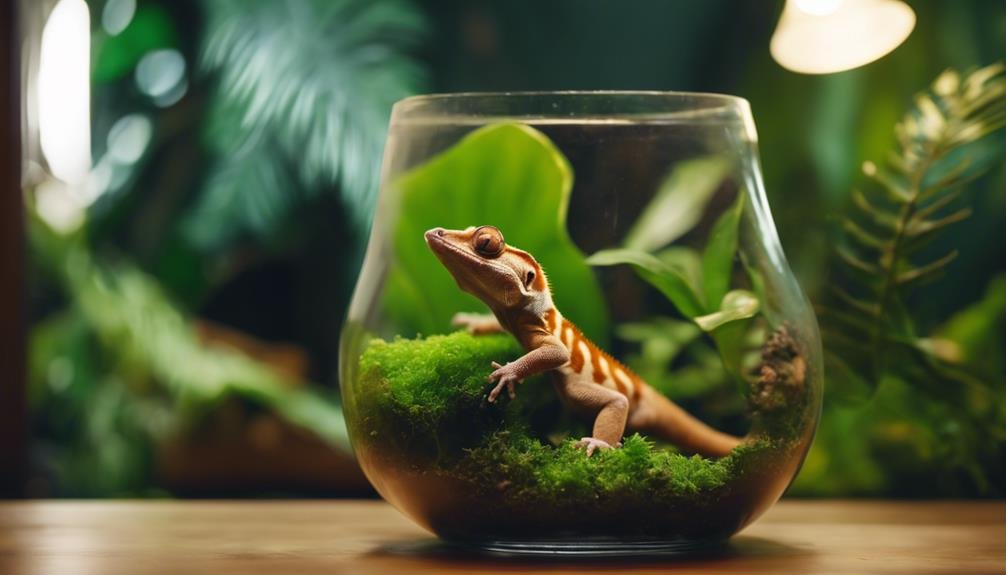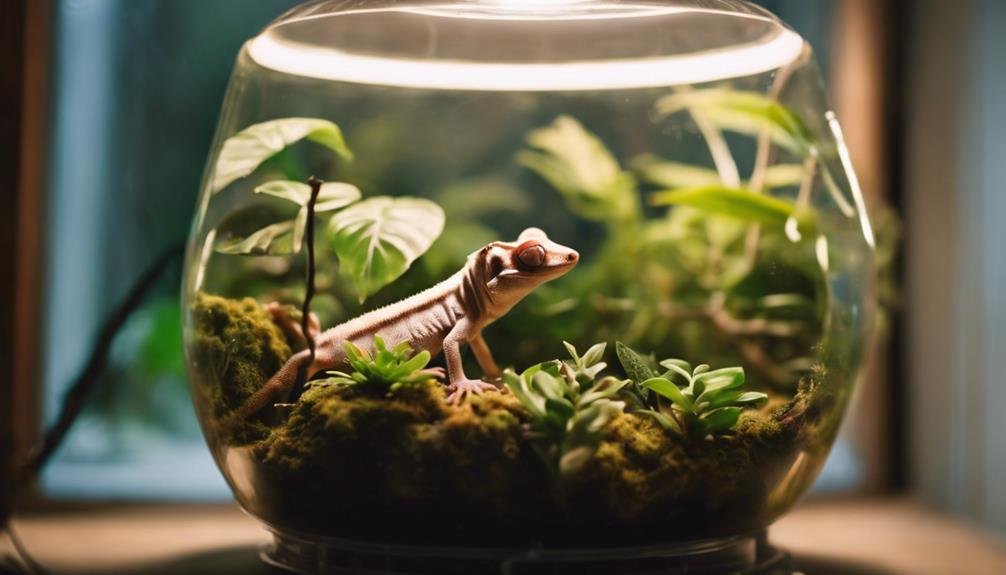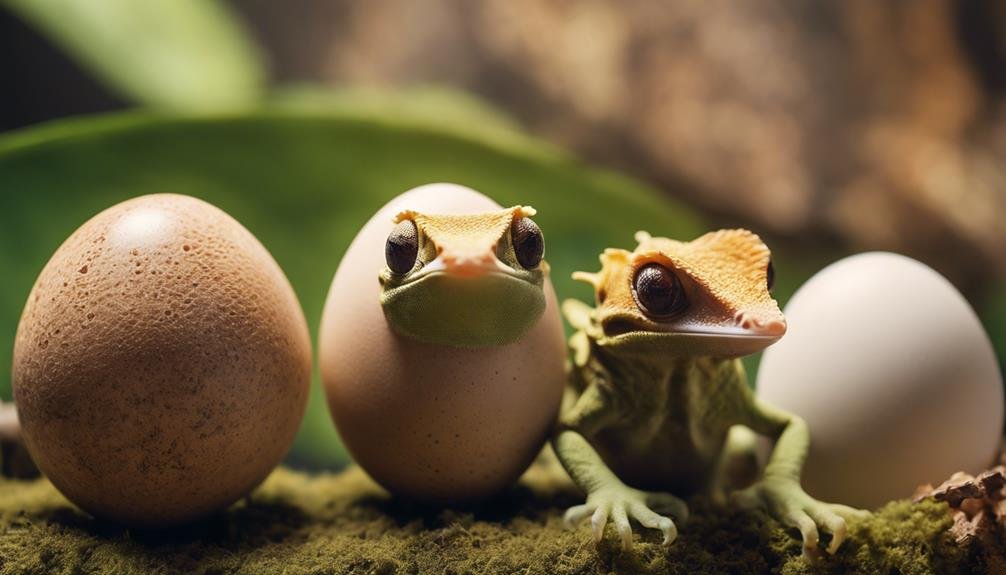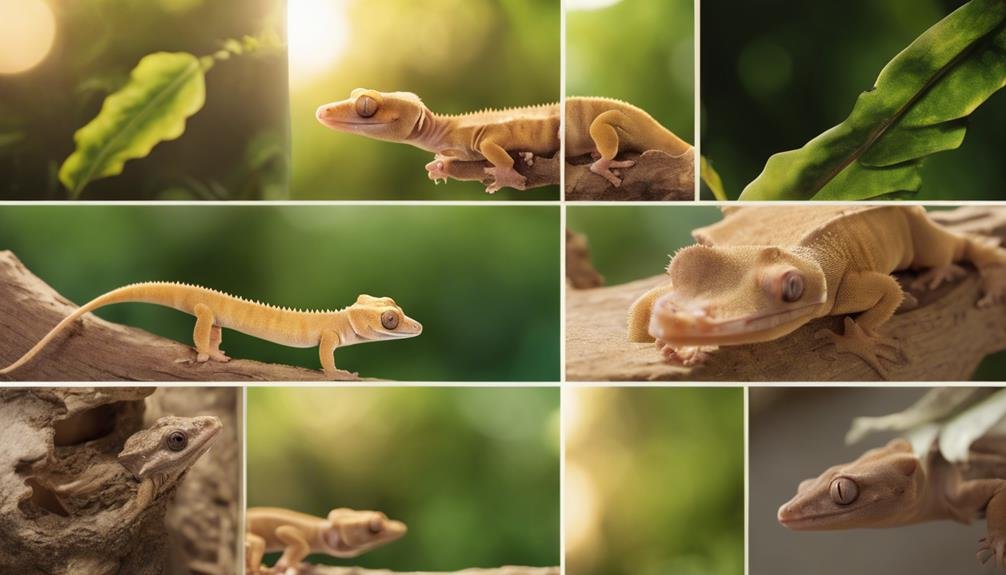You might be considering a crested gecko as your next pet, or perhaps you’re already a proud owner. Either way, you’re likely curious about how long you can expect your scaly friend to stick around. While crested geckos typically enjoy a lifespan of up to 20 years in captivity, several factors can influence their longevity. From their diet to the environment you provide, each plays an important role in not only how long they live but how well they live. But what specific elements are the most influential, and how can you optimize them to make sure your gecko not only survives but thrives? Let’s explore this further.
Key Takeaways
- Crested geckos can live up to 20 years in captivity.
- In the wild, their lifespan is typically shorter, about 4-5 years.
- Proper habitat maintenance, including temperature and humidity control, is essential.
- A balanced diet and regular health check-ups enhance longevity.
- Genetic factors and quality of care significantly influence their lifespan.
Crested Gecko Lifespan Overview
Crested geckos, in captivity, can live up to 20 years, reflecting their need for committed, long-term care. This longevity far surpasses their average lifespan in the wild, where they typically survive only 4 to 5 years. When you decide to make a crested gecko your pet, you’re signing up for potentially two decades of companionship. This species requires a dedicated guardian who understands the full extent of Crested Gecko Care.
Proper care for these pets isn’t overly complicated, but it’s essential. Ensuring your gecko thrives involves maintaining the right habitat temperature, providing a diet rich in variety, and regular health check-ups. These elements are vital in extending the lifespan of your gecko, highlighting why geckos make amazing pets for those who commit.
The difference in lifespan between wild and captive crested geckos underscores the impact of proper care. While the wild geckos face numerous threats, in a controlled environment, with the right care, your gecko can live a long, healthy life. So, if you’re looking for a long-term pet, a crested gecko could be the perfect choice, offering you years of unique companionship.
Factors Affecting Lifespan
Several factors play an important role in determining the lifespan of your crested gecko, from genetics to daily care practices. Understanding these can help you provide the best care, potentially extending your pet’s life.
Here’s what you need to know:
- Genetic Predisposition: Just like humans, your crested gecko’s lifespan can be influenced by its genetics. Genetic factors may predispose it to certain health issues, such as metabolic bone disease, which can greatly shorten its life if not managed properly.
- Care Practices: The way you house and care for your gecko impacts its wellbeing. Proper housing with the right temperature and humidity levels is vital. Neglecting these can lead to stress and health problems.
- Diet Quality: Feeding your gecko a well-balanced diet that includes the correct calcium-to-phosphorus ratio is essential. This prevents nutritional deficiencies and supports overall health, reducing the risk of metabolic bone disease.
- Regular Vet Visits: Don’t skip on vet visits. Regular check-ups can catch potential health issues early, making treatment more effective and less costly in the long run.
Captivity Vs. Wild Longevity


In captivity, geckos generally enjoy a much longer lifespan of 15 to 20 years, compared to just 4 to 5 years in the wild. This stark difference highlights the impact of human care on the longevity of crested geckos. In your home, you’ll control factors that are unpredictable in the wild, such as predators and diseases, which are major threats to their survival.
Captive care practices greatly enhance their health and lifespan. Regular vet visits and optimized living conditions mimic their natural habitat while eliminating many risks. Additionally, genetic predisposition plays an important role. In captivity, you can manage breeding to avoid genetic diseases, further enhancing their longevity.
Understanding these differences is key. While it’s thrilling to think of crested geckos in their natural environment, the wild doesn’t offer the security and stability that you can provide in a controlled setting. Their increased lifespan in captivity isn’t just about comfort, but also about the thorough care that addresses health directly. Remember, choosing to keep a crested gecko means committing to potentially two decades of care, ensuring they live a full, healthy life under your protection.
Diet and Nutrition Essentials
To guarantee your crested gecko thrives, a balanced diet including insects, fruits, and pollen is essential. The right nutrition not only supports their health but also enhances their lifespan. You’ll need to be mindful of the foods and supplements you provide to maintain this balance.
Here’s a breakdown of what to include in their diet:
- Commercial Diets: These are specially formulated to meet the nutritional needs of your gecko. They often include the necessary vitamins and minerals that might be hard to replicate with homemade mixes.
- Insects: Offer a variety of insects such as crickets, dubia roaches, or mealworms. These should be gut-loaded (fed nutritious foods to pass on to your gecko) and dusted with a calcium supplement to guarantee a proper calcium-to-phosphorus ratio.
- Fruits: Soft fruits like papaya, mango, and apricot can be mashed or offered in small pieces. These should be given in moderation to avoid excess sugar.
- Supplements: Calcium and vitamin D3 supplements are essential, especially if your gecko’s exposure to UVB light is limited. This helps prevent metabolic bone disease and other health issues.
Habitat and Environmental Control


Creating the right habitat for your crested gecko is vital, as they need specific temperature and humidity levels to stay healthy. You’ll want to maintain temperatures between 72-80°F during the day within their terrarium. Achieving this is easier if you use a heat mat controlled by a thermostat. This setup guarantees that your crested geckos have a consistent heat source without the risk of overheating.
Humidity is equally important. The humidity levels in their habitat should be kept above 50% to aid in shedding and their overall health. To manage this, misting the terrarium once or twice daily is necessary. It not only boosts the humidity but also mimics the moist environment they’re accustomed to in the wild.
For precise environmental control, invest in a reliable thermometer and hygrometer. These tools help you monitor the conditions inside the terrarium accurately, ensuring that your crested geckos live in comfort. Regular checks will help you adjust the heat mat settings or misting frequency as needed to maintain the ideal habitat for your pets. Tailoring these elements carefully extends their lifespan and enhances their well-being.
Health Care and Common Issues
Regular vet visits are essential for catching any health issues early and guaranteeing your crested gecko lives a long, healthy life. To prevent common issues like metabolic bone disease, which stems from calcium deficiency or insufficient vitamin D3, you’ll need to stay proactive about their health care.
Here’s how you can keep your crested gecko thriving:
- Regular Vet Check-Ups: Schedule check-ups at least once a year. These visits help identify and address any emerging health concerns before they become serious.
- Proper Diet: Feed your crested gecko a balanced diet rich in the necessary nutrients. Include foods that are fortified with calcium and vitamin D3 to prevent deficiencies.
- Necessary Supplements: Supplement your gecko’s diet with calcium and vitamin D3 powders. Lightly dust their food with these supplements to ensure they’re getting enough.
- Genetic Awareness: Be aware of genetic factors that could affect your gecko’s health. Choose reputable breeders and ask about the lineage to understand potential inherited health concerns.
Breeding and Life Stages


Understanding the breeding habits and life stages of crested geckos will further enhance your ability to care for them effectively. Crested geckos reach sexual maturity between 9 to 12 months, a phase significant for initiating the breeding process. When they mature, females can lay two eggs per clutch every 4 to 6 weeks post-mating, showcasing the repetitive nature of their reproductive cycle.
During egg laying, pay attention to the calcium sacs located in the mouth of female geckos. These sacs are essential as they provide the necessary calcium for egg development, highlighting their importance in the reproductive process. After the eggs are laid, the incubation period can last anywhere from 60 to 150 days. Managing temperature and humidity is key during this period to ensure successful egg hatching.
Once hatched, newly hatched geckos rely initially on their yolk sac for nutrition, which sustains them until they’re ready to start feeding independently. This early stage is critical as it sets the foundation for their growth and overall health. By understanding these life stages—from sexual maturity through to the nurturing of newly hatched geckos—you’re better equipped to provide the care needed for these fascinating creatures.
Is the Lifespan of Crested Geckos and Their Ability to Survive without Food Related?
Many people wonder if the lifespan of crested geckos and their ability to survive without food are related, especially when compared to leopard geckos without food. It’s important to consider the unique dietary needs and natural habitat of each species when discussing their lifespan and ability to go without food.
Enhancing Longevity Tips
To enhance your crested gecko’s lifespan, make sure you adopt a thorough care regimen that includes ideal housing, diet, and regular health checks. Proper care practices are essential to guarantee longevity in crested geckos. Here’s a straightforward guide to help you along:
- Balanced Diet: Offer a variety of insects and fruits to provide a balanced diet. It’s important to maintain a balanced calcium-to-phosphorus ratio and include essential supplements. This supports overall health and longevity.
- Ideal Housing Conditions: Create a comfortable environment with appropriate humidity and temperature maintenance. This mimics their natural habitat and reduces stress, which can greatly impact their health and lifespan.
- Regular Vet Visits: Schedule annual check-ups with a vet experienced in reptile care. These visits are crucial for preventive care and early detection of potential health issues.
- Temperature Maintenance: Ensure the enclosure is kept at best temperatures with proper gradients. This is essential for their digestion and overall physiological functioning.
Conclusion
To maximize your crested gecko’s lifespan, you’ll need to focus on a few key areas.
Make sure they have a balanced diet, maintain their habitat at ideal conditions, and stay vigilant about their health.
Regular vet check-ups and prompt treatment of any issues are essential.
By understanding their needs at different life stages and applying tips to enhance their longevity, you can help your crested gecko thrive for up to 20 years in captivity.


